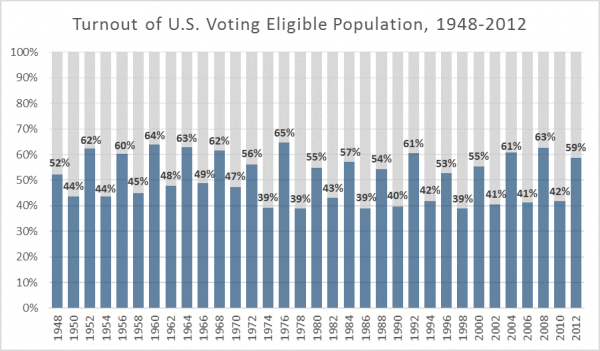Today is Election Day in America and if you ingest any form of media you know it’s the only thing anyone cares about….except that is not true at all. About 75% of American citizens are registered to vote and in 2012 only 59% of those people filled out a ballot. As seen below, the turnout for elections like today’s midterms are even more pitiful looking.
In fact, midterm voting turnout has dropped steadily since the 1840’s – the problem isn’t new but it’s more pressing than ever. No matter how you want this election to turn out (basically who you want to be in charge of making sure nothing happens), the fact so few people turn out to vote should be troubling to citizens of a democracy because a democracy is only as strong as the amount of people who vote and help steer decisions. Interestingly, the American government is very hands off when it comes to getting people to vote. Perhaps it’s due to government skepticism but when compared to other countries America should be doing more.
How the World Votes:
In Sweden more than 95% of their population votes. This is achieved through automatic enrollment for all citizens in a national database (somewhere someone in a bunker shouted, ‘I knew it!!”) which is linked to tax records. When it’s time for elections, Swedes can easily pop in and out of their local polling stations.
Going a step further is Australia which made voting mandatory. There’s even a $20 fine for those who didn’t vote. America would never be able to pull off anything that strict but the current hands off approach is simply not working.
There are those that say voting doesn’t matter, one vote won’t make a difference, and nothing’s going to change anyways. This apathy with the system may have some value, but this self defeating mentality is cancerous to the preservation and growth of the nation.
A million reasons can be given as to why a particular person doesn’t vote. They are too busy, don’t care, or can’t find time around their jobs. This can easily be solved. Make Election Day a federal holiday.
You can picture it now – a day of patriotic fervor that extols the message that America truly is the world’s greatest democracy. Having an entire day devoted to voting will give the message to those disillusioned with the process that the government and the people it represents take this system very seriously. If you need to bribe them a bit with the chance to sleep in, is that a bad thing?
Every single citizen should be proud to vote. America is so proud of being proud of itself that this holiday should easily become a reality. During the 109th Congress John Kerry and Hillary Clinton introduced legislation to this end but it did not pass. How un-American.
Fine. In this business obsessed society we live in, the ability to have one extra day off every two years might be asking a bit much. Alternatively, America could do what over 50 other nations do: hold elections on the weekend. Ever wonder why America votes on Tuesdays? Travel back to 1845 for the answer. The preferred day, Monday, was not viable since travel by horse took so long you could not make the trip to vote in the same day – of course there was no traveling on the Sabbath. So Tuesday became the day.
This antiquated reason for Tuesday voting should be a sign that the process needs to evolve. Holding elections on a holiday or the weekend would increase turnout. Or a truly novel idea comes from a recent New York Times opinion piece by David Schanzer and Jay Sullivan which calls for a constitutional amendment to increase House terms to 4 years thus eliminating midterm elections. This idea is compelling but unlikely to occur anytime soon. Maybe someday sooner America will adopt online voting – you wouldn’t even have to leave bed to elect the people that run the world. Now that sounds like a good deal.
